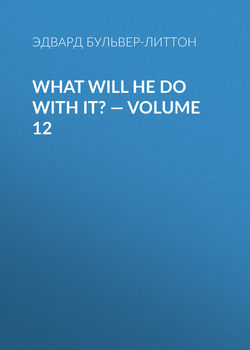What Will He Do with It? — Volume 12

Реклама. ООО «ЛитРес», ИНН: 7719571260.
Оглавление
Эдвард Бульвер-Литтон. What Will He Do with It? — Volume 12
BOOK XII
CHAPTER I
CHAPTER II
CHAPTER III
CHAPTER IV
CHAPTER V
CHAPTER VI
CHAPTER VII
CHAPTER VIII
CHAPTER IX
CHAPTER X
CHAPTER XI
CHAPTER XII. AND LAST
Отрывок из книги
In the letter which George told Waife he had received from his uncle, George had an excuse for the delicate and arduous mission he undertook, which he did not confide to the old man, lest it should convey more hopes than its nature justified. In this letter, Alban related, with a degree of feeling that he rarely manifested, his farewell conversation with Lionel, who had just departed to join his new regiment. The poor young man had buoyed himself up with delighted expectations of the result of Sophy's prolonged residence under Darrell's roof; he had persuaded his reason that when Darrell had been thus enabled to see and judge of her for himself, he would be irresistibly attracted towards her; that Innocence, like Truth, would be mighty and prevail; Darrell was engaged in the attempt to clear William Losely's name and blood from the taint of felony;—Alban was commissioned to negotiate with Jasper Losely on any terms that would remove all chance of future disgrace from that quarter. Oh yes! to poor Lionel's eyes obstacles vanished—the future became clear. And thus, when, after telling him of his final interview with the Minister, Darrell said, "I trust that, in bringing to William Losely this intelligence, I shall at least soften his disappointment, when I make it thoroughly clear to him how impossible it is that his Sophy can ever be more to me—to us—than a stranger whose virtues create an interest in her welfare"—Lionel was stunned as by a blow. Scarcely could he murmur:
"You have seen her—and your resolve remains the same."
.....
The past!—Was it not true? That home to whose porch came in time the Black Horses, in time just to save from the last worst dishonour, but not save from years racked by each pang that can harrow man's dignity in each daily assault on the fort of man's pride; the sly treacherous daughter— her terrible marriage—the man whose disgrace she had linked to her blood, and whose life was still insult and threat to his own. True, what a war upon Pride! And even in that secret and fatal love which had been of all his griefs the most influential and enduring, had his pride been less bitterly wounded, and that pride less enthroned in his being, would his grief have been so relentless, his attempts at its conquest so vain? And then, even now—what was it said, "I can bless?"—holy LOVE! What was it said, "but not pardon"?—stern PRIDE! And so onto these last revolutions of sterile life. Was he not miserable in Lionel's and Sophy's misery? Forlorn in that Citadel of Pride—closed round and invested with Sorrows—and the last hopes that had fled to the fortress, slain in defence of its outworks. With hand shading his face, Darrell remained some minutes silent. At last he raised his head, and his eye was steadfast, his lip firm.
"George Morley," said he, "I acknowledge much justice in the censure you have conveyed, with so artful a delicacy that, if it fail to reform, it cannot displease, and leaves much to be seriously revolved in solitary self-commune. But though I may own that pride is not made for man, and that in the blindness of human judgment I may often have confounded pride with duty, and suffered for the mistake, yet that one prevailing object of my life, which with so startling a truth you say it has pleased Heaven to frustrate, I cannot hold an error in itself. You have learned enough from your uncle, seen enough of me yourself, to know what that object has been. You are scholar enough to concede to me that it is no ignoble homage which either nations or persons render to the ancestral Dead—that homage is an instinct in all but vulgar and sordid natures. Has a man no ancestry of his own—rightly and justly, if himself of worth, he appropriates to his lineage all the heroes, and bards, and patriots of his fatherland! A free citizen has ancestors in all the glorious chiefs that have adorned the State, on the sole condition that he shall revere their tombs and guard their memory as a son! And thus, whenever they who speak trumpet-tongued to grand democracies would rouse some quailing generation to heroic deed or sacrifice, they appeal in the Name of Ancestors, and call upon the living to be worthy of the dead! That which is so laudable—nay, so necessary a sentiment in the mass, cannot be a fault that angers Heaven in the man. Like all high sentiments, it may compel harsh and rugged duties; it may need the stern suppression of many a gentle impulse—of many a pleasing wish. But we must regard it in its merit and consistency as a whole. And if, my eloquent and subtle friend, all you have hitherto said be designed but to wind into pleas for the same cause that I have already decided against the advocate in my own heart which sides with Lionel's generous love and yon fair girl's ingenuous and touching grace, let us break up the court; the judge has no choice but the law which imperiously governs his judgment."
.....